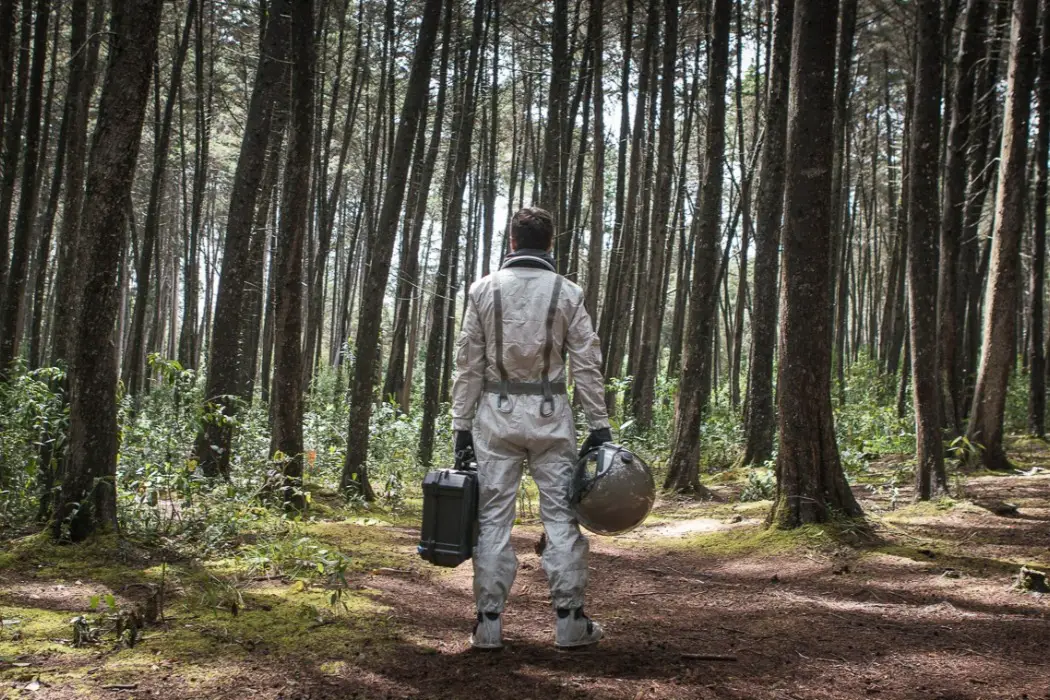ORBITER 9: Indie Sci-fi Just About Lives On

Becky spends her days working in TV and she spends…
It’s not ideal to include spoilers within a review, but with Netflix’s new original film Orbiter 9 (directed by Hatem Khraiche Ruiz-Zorilla) it’s almost impossible not to allude to the several plot twists that are pretty integral to any sort of discussion of the film’s narrative. Having said that, this review will be as spoiler light as possible… within reason.
Seeming to walk in the footsteps of films such as the 2016 film Passengers and Duncan Jones’ Moon, Orbiter 9 follows the experiences of Helena (Clara Lago), the lone passenger on a spaceship bound for an uninhabited planet named Celeste. With her parents bidding her goodbye a few years ago due to a shortage of oxygen (via video message – how intimate), Helena believes them to be dead, leaving only herself to guide the ship to Celeste and ‘colonise’ the planet.
As she becomes dangerously close to running out of oxygen herself, Helene’s ship is intercepted by an engineer, Alex (Alex Gonzalez), who has come to repair the broken oxygen circuits. The two are immediately drawn to one another, eating dinner and then spending the night together. Quickly, it becomes apparent that something doesn’t add up, and that Helene’s journey may not be what she has been led to believe it is. Far from the mission to seek a new planet and colonise it, Helene and Alec are now pushing back against government forces that are hiding a huge secret.
A New Colony
Orbiter 9 is reminiscent of shoe-string budget sci-fi films – in addition to the aforementioned Moon, Danny Boyle’s Sunshine also springs to mind. Rather than relying on costly explosions or producing huge set pieces, Orbiter 9 utilises a few key locations, innovative graphics and clever lighting set-ups to achieve a distinct look.

One key example of this is within the counselling room. In this future world (where humans have destroyed Earth) counselling is delivered via a mesmerising wolf hologram, projected onto a two way mirror. One of Orbiter 9’s most tense and memorable sequences takes place in this simple, yet beautifully achieved set up – as Helene and Alex attempt to hide behind a static wolf image, knowing the slightest movement will give them away.
Director Ruiz-Zorilla also focuses in on his characters within the film, from the stoic Helene to the more emotionally driven Alec. On Helene’s departure from the ship, Ruis-Zorilla uses the camera to give the audience Helene’s dazed and confused perspective – the shot sliding in and out of focus, everything is a little too bright. This is all new to Helene, and seeing through her eyes allows us to identify with her.
The use of the word “colonise” is another interesting aspect (it’s a word used throughout the film), and the more we learn about how Helene came to exist in the world, the more appropriate it becomes. Naturally, the Orbiter project would want individuals with powerful colonialist mentality to ensure that they are prepared to fight for whatever it is they find when they finally reach Celeste. There’s no suggestion that Celeste is home to any native species, but the word colonise has such an embedded historical context in our understanding that it immediately conjures up atrocities committed by humans, against other humans for the want of land and resources.
Save the girl, save the world?
It does seem strange, and a little convenient, that Alex doesn’t see the need to save any of the other Orbiter subjects. He describes Helene as different from the others, insinuating that she has a quality that they cannot possibly possess. No evidence of this emerges though, and Helene is also quick to disregard the idea of trying to save anyone else once Alex rejects it.
Alex really only gains a moral perspective on the project once he meets Helene. It’s hard to believe that Alex wouldn’t have any objections at all before this (his boss insinuates that Alex is very heavily embedded within the project and therefore he has probably seen more of it than anyone else), and that once he decided the project was immoral, he only wanted to rescue one subject.
Of course, this could all be down to the romance narrative between Helene and Alex – which may be the point in itself. Orbiter 9 doesn’t really seem to imply that their love or attraction is the key ingredient here. Certainly for Helene, her attraction to Alex seems to be more along the lines of being happy to see another living human being for the first time in years than anything else. He’s also the first person who has given any thought to her well being, emotional or physical needs – as her parents turn out to have not been entirely honest with her.

There’s also an element of wanting to live a ‘normal’ experience; Helene tells Alex that she’s never kissed anyone before the two of them have sex. It feels like Helene just wants to experience normal human interactions, and Alex is almost a means to an end in that respect.
There seems to be a kind of renaissance in space exploration in film and television at the moment. The Lost in Space reboot, in particular, bears an uncanny resemblance to Orbiter 9 – the former being far more family friendly – in their individual discussions of the death of planet Earth, humanity’s legacy in history and the colonisation of space. Orbiter 9 is a nice addition to this canon of films, but it doesn’t really add that much to the conversation.
Orbiter 9: If You Can’t Beat Them…
Orbiter 9 concludes with an odd kind of ‘if you can’t beat them, join them’ shrug – which seems distinctly in opposition to the rest of the film. Quite what else Alex and Helena could have done isn’t clear, so perhaps this was the only way to end it. It’s definitely in keeping with it’s sci-fi inspirations (the greater good is more important than individual autonomy, corporate overlords inevitably win), but Orbiter 9 did leave me with a fair few more questions which I felt should have been answered.
Orbiter 9 is currently streaming on Netflix (worldwide).
What did you think of Orbiter 9? Let us know in the comments!
Does content like this matter to you?
Become a Member and support film journalism. Unlock access to all of Film Inquiry`s great articles. Join a community of like-minded readers who are passionate about cinema - get access to our private members Network, give back to independent filmmakers, and more.
Becky spends her days working in TV and she spends every other minute writing about cinema, TV & feminism. Based in London, she also likes drinking gin, re-watching 'The X Files' and writing about on-screen representation and all manner of things over at femphile.com













